Police have “all the resources they need” to deal with riots and disorder, a minister has said amid concerns over the prospect of further violence sweeping across parts of the country.
Courts could sit overnight to ensure “thugs” who “maraud our streets” are brought to justice, while forces have measures in place to draft in extra officers to tackle potential unrest, Dame Diana Johnson has indicated.
Prime Minister Sir Keir Starmer has given police his “full backing” to take any action necessary to respond to “extremists” attempting to “sow hate” after scenes of disorder in England and Northern Ireland this week.
But concerns have been raised that officers may be left unable to deal with other incidents as a result of the need to focus efforts on the prospect of ongoing rioting, with the Police Federation warning: “There is a cost to all this.”
Masked anti-immigration demonstrators smashed windows at a Holiday Inn Express in Rotherham, South Yorkshire, on Sunday.
Greater Manchester Police said a Section 34 dispersal notice has been authorised covering Bolton until 10pm on Sunday, where a protest is expected later.
Teams worked through the night to reopen streets in cities like Hull, where volunteers armed with brushes turned up from 7am to assist council crews.
“Yesterday we saw the worst of Hull but already today we have seen the best,” councillor Jack Haines of Hull City Council said.
Asked whether enough is being done to respond to the disorder, policing minister Dame Diana said the Government has been “reassured” that forces are able to meet the scale of the challenge.
“The police have made it very clear that they have all the resources they need at the moment… they have the powers that they need,” the minister told BBC News.
“There is no need to bring in the Army and there has been no discussion about that.
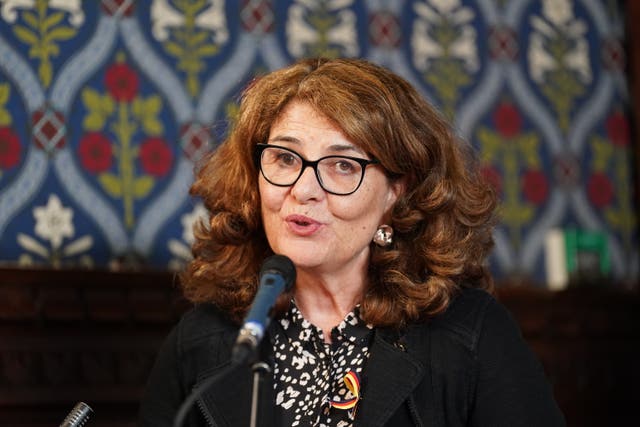
“(Police) have long-standing plans in place for mutual aid if they need to put extra police officers into certain parts of the country.”
Despite the Government recently announcing the early release of some offenders to ease prison overcrowding, Dame Diana said there is jail capacity to hand custodial sentences to those “marauding our streets”.
Asked whether courts could be forced to sit overnight to fast-track prosecutions as they did for the 2011 riots, she said the Government will do “whatever it takes” to ensure people are brought to justice.
Deputy national chair of the Police Federation, Brian Booth, told the PA news agency that forces can handle the unrest in the short-term, but it will likely put further pressure on already-stretched resources.
Criminal violence and thuggery on our streets will not be tolerated.
Police forces have my full support in ensuring that those who engage in criminal disorder face the strongest possible penalties. pic.twitter.com/ZqoOHVXnVR
— Yvette Cooper (@YvetteCooperMP) August 3, 2024
“There is a cost to all this,” he said. “Every day this continues means a certain amount of officer hours are being taken away from other policing duties. It has a massive effect on already significant under-resourcing.”
Some areas may see a diminished police presence as a result of less robust preventative patrols because officers “can’t be in two places at once”, he said.
Scanning CCTV and other footage in incident rooms to identify suspects and deploying to the scene of disorder means fewer staff on the beat, Mr Booth warned.
Officers taken out by injuries will also deplete forces, he said, adding: “It’s truly awful. These are the images I never want to see, of colleagues being battered just for doing their job.”
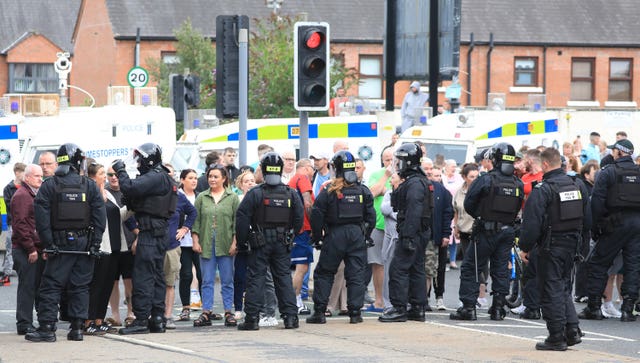
The far-right has drawn widespread condemnation as the organising force behind scenes of disorder in multiple towns and cities in the wake of the killings of three young girls in Southport on Monday.
False claims had spread online that the suspect, later identified as 17-year-old Axel Rudakubana from Lancashire, was an asylum seeker who had arrived in the UK by boat.
Bricks, chairs and bottles have been pelted at officers, mosques have been attacked, and a police station along with a number of community facilities across the country, including a library, have been torched in the violence.
Home Secretary Yvette Cooper said people involved in the clashes “will pay the price” and that “criminal violence and disorder has no place on Britain’s streets”.
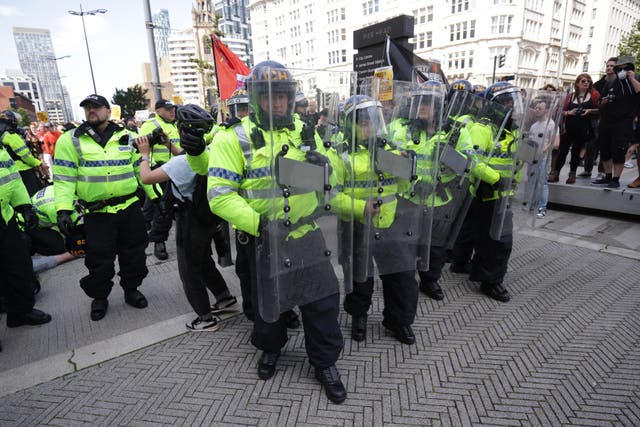
At least 90 arrests have been made across the country and some charges have been brought, with police warning of more to come once footage has been scoured.
Sir Keir held crisis talks with ministers on Saturday over the unrest, with Justice Secretary Shabana Mahmood telling colleagues “the whole justice system is ready to deliver convictions as quickly as possible”.
There was violence on Saturday in towns and cities such as Hull, Liverpool, Stoke-on-Trent, Nottingham, Bristol, Manchester, Blackpool and Belfast which saw several police officers injured.
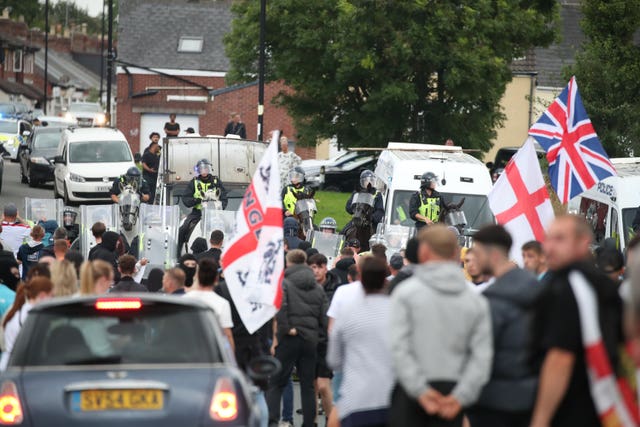
In Liverpool, Merseyside Police said about 300 people were involved in violent disorder on County Road, Walton, which included community facilities being set on fire.
The Spellow Lane Library Hub, which was opened last year to provide support for one of the most deprived communities in the country, suffered severe damage to the ground floor.
Police said rioters tried to prevent firefighters from accessing the blaze, throwing a missile at the fire engine and breaking the rear window of the cab.
A total of 23 people were arrested on Saturday, Merseyside Police said, including 12 arrests for the disorder in the city centre, nine arrests for the disorder on County Road and two arrests in connection with disorder in Southport.
One officer was kicked and knocked off his motorcycle by a demonstrator and others tried to kick riot shields.
A strong & visible police presence remains in Hull City Centre tonight as 20 arrests now made for various public order offences. ACC Mike Walker:"Enforcement action will continue as we will not tolerate mindless violence & disorder in our city." More here: https://t.co/QA8xG8g3l4
— Humberside Police (@Humberbeat) August 3, 2024
Assistant Chief Constable Alex Goss called the behaviour of protesters “deplorable”, adding: “The impact of the disorder will be devastating for the people of Walton, but I promise that we are doing everything in our power to arrest those involved and bring them to justice.”
In Bristol, police made 14 arrests because of violent disorder in the city centre, which Avon and Somerset Police described as “completely unacceptable”.
Lancashire Police said more than 20 people were arrested and dispersal orders were issued in parts of Blackpool, Preston and Blackburn.
Staffordshire Police said 10 people were arrested following disorder in Stoke-on-Trent.
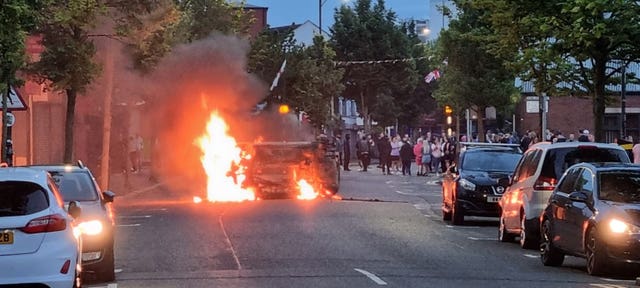
Further protests are planned for Sunday and more trouble is likely in the coming days, police said.
“We know people will try and do this again and policing has been and will continue to be ready,” said Chief Constable BJ Harrington, who speaks on public order for the National Police Chiefs’ Council.
“There are 130 extra units in place across the country, meaning almost 4,000 extra public order-trained officers to deploy.
“So if you’re planning to cause trouble and disorder our message is very simple – we’ll be watching you.”




Read the rules hereComments are closed on this article